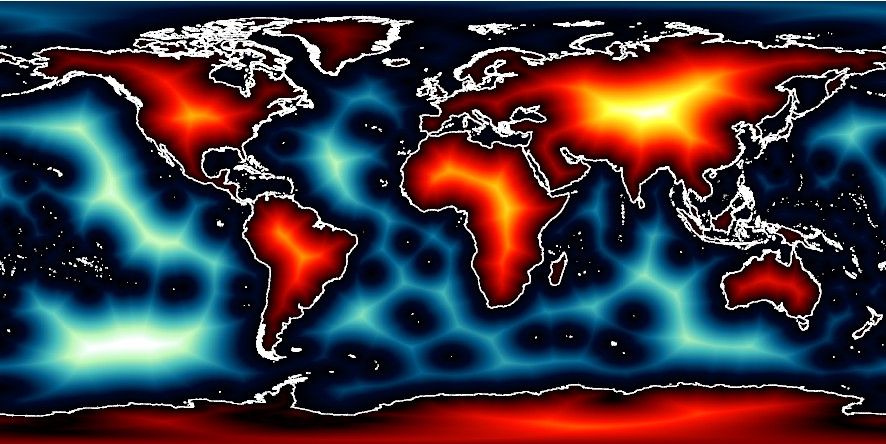pygmt.datasets.load_earth_dist
- pygmt.datasets.load_earth_dist(resolution='01d', region=None, registration='gridline')[source]
Load the GSHHG Earth distance to shoreline dataset in various resolutions.

GSHHG Earth distance to shoreline dataset.
This function downloads the dataset from the GMT data server, caches it in a user data directory (usually
~/.gmt/server/earth/earth_dist/), and load the dataset as anxarray.DataArray. An internet connection is required the first time around, but subsequent calls will load the dataset from the local data directory.The dataset can also be accessed by specifying a file name in any grid processing function or plotting method, using the following file name format: @earth_dist_res_reg. res is the grid resolution; reg is the grid registration type (p for pixel registration, g for gridline registration). If reg is omitted (e.g.,
@earth_dist_01d), the gridline-registered grid will be loaded for grid processing functions and the pixel-registered grid will be loaded for plotting functions. If res is also omitted (i.e.,@earth_dist), GMT automatically selects a suitable resolution based on the current region and projection settings.This dataset comes with a color palette table (CPT) file,
@earth_dist.cpt. To use the dataset-specific CPT when plotting the dataset, explicitly setcmap="@earth_dist.cpt", otherwise GMT’s default CPT (turbo) will be used. If the dataset is referenced by the file name in a grid plotting method, the dataset-specific CPT file is used automatically unless another CPT is specified.Refer to https://www.generic-mapping-tools.org/remote-datasets/earth-dist.html for more details about available datasets, including version information and references.
- Parameters:
resolution (
Literal['01d','30m','20m','15m','10m','06m','05m','04m','03m','02m','01m'], default:'01d') – The grid resolution. The suffixdandmstand for arc-degrees and arc-minutes.region (
Sequence[float] |str|None, default:None) – The subregion of the grid to load, in the form of a sequence [xmin, xmax, ymin, ymax] or an ISO country code. Required for grids with resolutions higher than 5 arc-minutes (i.e.,"05m").registration (
Literal['gridline','pixel'], default:'gridline') – Grid registration type. Either"pixel"for pixel registration or"gridline"for gridline registration.
- Return type:
- Returns:
grid – The GSHHG Earth distance to shoreline grid. Coordinates are latitude and longitude in degrees. Distances are in kilometers, where positive (negative) values mean land to coastline (ocean to coastline).
Note
The registration and coordinate system type of the returned
xarray.DataArraygrid can be accessed via the GMT accessors (i.e.,grid.gmt.registrationandgrid.gmt.gtyperespectively). However, these properties may be lost after specific grid operations (such as slicing) and will need to be manually set before passing the grid to any PyGMT data processing or plotting functions. Refer topygmt.GMTDataArrayAccessorfor detailed explanations and workarounds.Examples
>>> from pygmt.datasets import load_earth_dist >>> # Load the default grid (gridline-registered 1 arc-degree grid) >>> grid = load_earth_dist() >>> # Load the 30 arc-minutes grid with "gridline" registration >>> grid = load_earth_dist(resolution="30m", registration="gridline") >>> # Load high-resolution (5 arc-minutes) grid for a specific region >>> grid = load_earth_dist( ... resolution="05m", ... region=[120, 160, 30, 60], ... registration="gridline", ... )